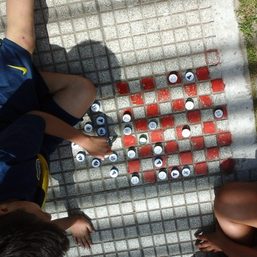SUMMARY
This is AI generated summarization, which may have errors. For context, always refer to the full article.

Content warning: This article contains sensitive descriptions.
MANILA, Philippines – As the Philippines ramps up efforts to better fight online sexual exploitation of children (OSEC) in the country, predators are getting more creative to get close to children to exploit. One way is through emojis, a nonprofit found.
Bahay Tuluyan, a children’s rights nongovernmental organization (NGO), flagged a “deeply concerning trend” in which the predators’ tool of choice to befriend children online is emojis.
Many smartphone users use emojis, or small icons depicting expressions, symbols, objects, or places, in their messaging tools regularly. Citing the United Nations Children’s Fund and International Criminal Police Organization, Bahay Tuluyan said hundreds of thousands of online predators use emojis to befriend children. The NGO’s estimate is 500,000.
“They pretend to be kids and use emojis as a way to get close [to] our children and abuse them, get images of their private parts, or even get them to perform sexual acts,” said Bahay Tuluyan executive director Catherine Scerri.
The NGO came up with a campaign to spread awareness of the tactic among parents. Part of the campaign is a video created in partnership with TBWA\Santiago Mangada Puno.
The video features various emojis that may be used by predators to convey certain body parts or meanings.
- Eggplant 🍆 – penis
- Peach 🍑 – buttocks
- Water droplets 💦 – orgasm
- Wink 😉 – lust
- Cherry 🍒 – breasts
- Corn 🌽 – pornography
- Taco 🌮 – vagina
- Donut 🍩 – anus
While Bahay Tuluyan notes befriending through emojis as a trend, other reports have earlier noted how pedophiles use emojis to communicate. Meanwhile, a United Nations office reported in 2020 that children as young as 4 or 5 have “emoji conversations” with friends through parents’ or guardians’ phones.
In July 2022, a Philippine measure seeking to address online sexual exploitation of children lapsed into law.
Billion-peso industry
In 2022, almost half a million Filipino children or roughly 1 in 100 children were trafficked to produce child sexual exploitation material (CSEM) for profit, according to the International Justice Mission (IJM).
The abuse was driven by foreign demand, particularly from the United States, United Kingdom, Australia, Canada, and Europe.
CSEM for profit usually happens in the form of livestreamed abuse, where a local trafficker in the Philippines abuses a child in person, while an offender, “typically from a Western country,” watches the abuse via video call, IJM said. Local Philippine traffickers earn as little as $25 (P1,408) from their foreign clients to abuse children in front of cameras.
Meanwhile, in an April 2023 report, the Philippine Anti-Money Laundering Council found 92,200 OSEC-related suspicious transaction reports (STRs) by the end of 2022 – a dramatic increase from just 204 from 2015. During this time period, a whopping P1.56-billion ($27.70 million) aggregate amount was involved in over 182,700 OSEC-related STRs.
Yet the Philippines remains on Tier 1 of the US State Department’s 2023 Trafficking in Persons Report for the eighth consecutive year. Accounting for all forms of trafficking and not just child sexual exploitation, the report places a country on Tier 1 if it deems a government has made efforts to adequately address human trafficking.
In June 2023, a US State Department official said the US lauded the Philippines for investigating more trafficking victims, amending its anti-trafficking law, and increasing funding. However, the Philippines “did not vigorously investigate or prosecute labor trafficking crimes that occurred within the Philippines.” – Rappler.com
$1 = P56.32
To report cases of child sexual abuse, contact the Philippine National Police-Women and Children Protection Center at 0919 777 7377 or the 1343 Actionline hotline for human trafficking.
Add a comment
How does this make you feel?





![[OPINION] The child no one looked for](https://www.rappler.com/tachyon/2024/01/20240123-child-no-one-look-for-1.jpg?resize=257%2C257&crop=262px%2C0px%2C720px%2C720px)




![[OPINYON] Diborsiyo sa mata ng isang anak](https://www.rappler.com/tachyon/2024/06/new-school-divorce-children-june-13-2024.jpg?resize=257%2C257&crop=294px%2C0px%2C720px%2C720px)












There are no comments yet. Add your comment to start the conversation.